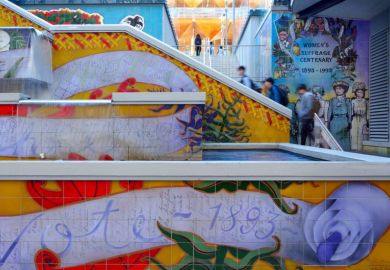When Joyce Msuya’s daughter came home after her first year at the University of British Columbia, she went through the kitchen cabinets and removed all the plastic straws (the family now use metal straws).
Ms Msuya, deputy executive director of the United Nations Environment Programme (UNEP), told the Times Higher Education World Academic Summit that this was just one small example of how a university experience could influence personal behaviours and choices.
“Social development goals are everyone’s business, and universities have a role to play,” she said. “Sustainability is about people. It’s about being aware; it’s a lifestyle.”
The UNEP, based in Kenya, is exploring multiple avenues for working with universities on sustainability, such as advocating for greener campuses, incorporating environmental materials in curricula, and using technology for youth engagement, for example through gaming.
It is also looking to “mainstream” environmental issues through the publication of The Little Book of Green Nudges, which contains 40 simple suggestions for campuses, and was launched during the World Academic Summit on 2 September.
“Each year, 200 million students go to universities, and most of them are in their formative years,” Ms Msuya said. While research and classroom teaching were central to what universities do, “equally, if not more important, is how they influence these 200 million youth”.
Her own experience, as an undergraduate studying microbiology at the University of Strathclyde, gave her “a sense of purpose” outside the classroom.
Today, with digital communications, that communal sense of responsibility was even stronger between students globally. “One stark difference between my time – as a foreign student in Glasgow – and my daughter’s time is how much more the world is interconnected,” she said.
Ms Msuya called today’s young people “very nimble when it comes to influencing environmental issues”. She cited as an example the instrumental role they played in lobbying politicians to approve the Paris Agreement, the landmark 2015 accord to combat climate change. She urged universities to “capitalise on this asset – their students, who will be the leaders of tomorrow”.
Some higher education institutions are already taking the lead. For example, Arizona State University, which is the top US institution in the THE Impact Rankings (which assess universities against the UN’s Sustainable Development Goals) has a dedicated School of Sustainability.
Universities were already in an “advantageous position”, Ms Msuya explained, given the rapid shift to distance learning and virtual classes during the Covid-19 crisis.
“There are already a lot of twinning arrangements between developed and developing nations, and lots of sharing of SDG data between universities,” she said.
Looking ahead, she felt there could be even more exchanges – both for academics and students – between developing and developed nations. “We need to develop capacity where it is needed,” she said.
This is particularly important in fields where there is a big digital divide, for example, in artificial intelligence. When Ms Msuya worked for the World Bank in South Korea, she saw AI being used in manufacturing. In her new base in Kenya, however, “there’s limited capacity”.
“We’re striving to do more on big data, and universities across the globe have quite a wealth of knowledge in this field,” she said.
However, the use of technology had to be balanced with ethical concerns and quality data.
“Universities can play that role in introducing AI for the global public good,” she said. “But you need global mechanisms to oversee quality assurance – as they say, ‘garbage in, garbage out’.”
She concluded that universities should keep sustainability at the heart of their development. “Instead of building ground infrastructure, build green infrastructure and human infrastructure,” she advised.
Register to continue
Why register?
- Registration is free and only takes a moment
- Once registered, you can read 3 articles a month
- Sign up for our newsletter
Subscribe
Or subscribe for unlimited access to:
- Unlimited access to news, views, insights & reviews
- Digital editions
- Digital access to THE’s university and college rankings analysis
Already registered or a current subscriber?









